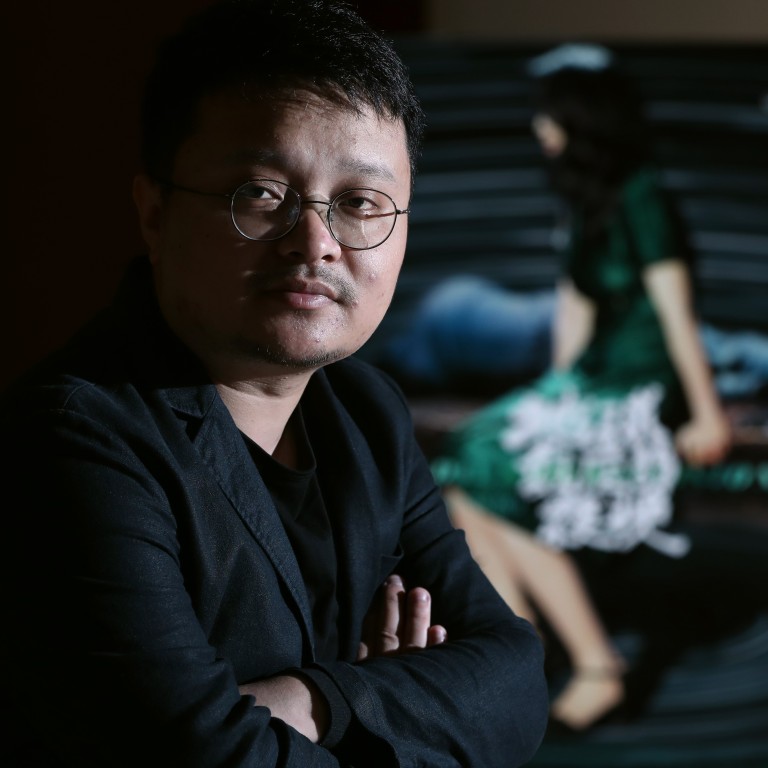
Bi Gan is blazing a trail for other indie Chinese filmmakers despite big marketing fail
- Cinema-goers were expecting a romcom and an excuse for a New Year’s Eve smooch, but Long Day’s Journey into Night is a far more challenging affair
Aimed at couples seeking a romantic New Year’s Eve, Huace Pictures’ high-risk marketing strategy for Bi Gan’s Long Day’s Journey into Night faced a swift backlash.
Ahead of the film’s release in China on December 31, the production company had issued a public statement requesting cinemas to schedule screenings at 9.40pm, so that the 140-minute film would end exactly at midnight, and encouraged audience members to lock lips in the final scene, copying the protagonists.
Chinese film-goers flock to art house movie they took for a romcom
“Audiences could spend a most commemorative night with the most important person in their lives,” went the promotional blurb. “A kiss which marks the leap into the new year!”
But Long Day’s Journey into Nightis not the mainstream romcom many viewers had been expecting. With a stellar cast that includes Tang Wei, Huang Jue and Sylvia Chang Ai-chia, the film has a non-linear structure, dark and dank atmospherics, multiple voice-overs and an hour-long 3D depiction of a dream. Bi’s second film is, in effect, a big-budget reprise of his debut, Kaili Blues (2015).
Unsurprisingly, online portals were inundated with vicious comments from viewers who’d obviously had no inkling of the director’s background or his trademark aesthetics. Cinema proprietors reacted by slashing screenings of the film, with the number of shows dropping from 118,500 on its opening day to just over 45,000 the day after. Ticket sales plunged 95 per cent to 12 million yuan (HK$13.7 million).
Backlash aside, however, the 29-year-old director has left an indelible mark on contemporary Chinese cinema. Whether you love or hate his fantastical mise-en-scène and warped timelines, Bi – or, more specifically, the critical acclaim he has received on the international festival circuit – has allowed rookie mainland filmmakers to dare to dream of a future beyond the gritty social realism of their forebears.
Since the 1990s, film critics have largely seen Chinese independent cinema through a socially conscious, neorealist prism, a template that yielded first the so-called sixth generation of filmmakers, then the digital generation, who made their movies with inexpensive cameras, and, finally, the millennials inspired by their realist predecessors.
Kaili Blues was like a jolt. Revolving around a doctor’s search for his nephew in a small town in the southwestern province of Guizhou, the film was a first for the Chinese art-house scene.
Drawing inspiration from Thai director Apichatpong Weerasethakul, who spliced his rural stories with touches of surrealism, Kaili Blues featured otherworldly objects and settings (a house under a waterfall, a television broadcasting poetry), characters with blurred identities and a 40-minute take in which the narrative is deconstructed and then reassembled as a dream.
Kaili Blues proved a roaring success on the festival circuit in Europe, winning awards at Locarno, in Switzerland, and Nantes, in France. Bi’s new-found status led to Chinese commercial studios and French companies boarding what would eventually become Long Day’s Journey into Night. And it is with this film that Bi has dived completely into magical realism: serving as his script consultant is Zhang Da-chun, the Taiwanese writer known for works such as Jiangjun Bei (“The General’s Monument”; 1986).
Bi’s innovative filmmaking has inspired some of his peers to do the same: Yang Heng’s dark road movie Ghost in the Mountains (2017) amplifies the bleak fatalism of Kaili Blues in its depiction of a man’s ill-fated encounters with past friends and old flames as he returns to his dilapidated hometown, while in Vanishing Days (2018), self-taught 22-year-old director Zhu Xin’s low-budget debut, the narrative zigzags between a teenager’s family problems and her attempt to incorporate the tragic memories of her mother’s widowed friend into a school essay.
More such films are on the way, as demonstrated by rough cuts shown during the work-in-progress showcase at the Pingyao Crouching Tiger Hidden Dragon International Film Festival, in October. Among them are Huang Zi’s trifurcated All About ING, which shifts from a seemingly ordinary family drama into a trance-like climax, and Chang Biao’s Unknown Time, which contains Kaili Blues-like imagery galore in a story revolving around a man confronting his memories in a village of eccentrics.
Regardless of what the masses might think, Bi has certainly been blazing a trail.

